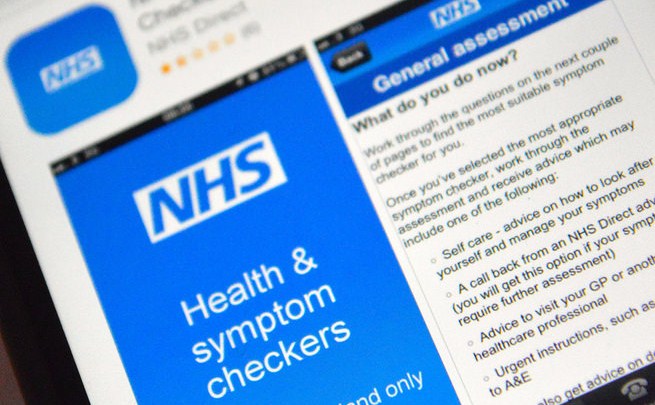05 July 2018
Expert Patients
The new NHS app.
By John Watson
 Jerome K Jerome’s Three Men in a Boat is one of the funniest books in the English language. It begins, however, with a perceptive (and, of course, funny) commentary on patient behaviour. The hero is not feeling well and decides that he will consult a medical dictionary. As he reads about each disease, apart from housemaids’ knee, he comes to the conclusion that he suffers from it. He sets off in panic to the doctor whose prescription – which leads to the hilarious river trip on which the book is centred – includes an injunction not to read things which he does not understand.
Jerome K Jerome’s Three Men in a Boat is one of the funniest books in the English language. It begins, however, with a perceptive (and, of course, funny) commentary on patient behaviour. The hero is not feeling well and decides that he will consult a medical dictionary. As he reads about each disease, apart from housemaids’ knee, he comes to the conclusion that he suffers from it. He sets off in panic to the doctor whose prescription – which leads to the hilarious river trip on which the book is centred – includes an injunction not to read things which he does not understand.
If you like to laugh and have not read the book, you should certainly do so at once, but like everything which is really funny, this opening description of hypochondria is based on a truth. Describe the symptoms of any disease to most of us and we will begin to suspect that we have got it. That, after all, is why the term “man flu” was invented.
It is when you keep this human frailty in mind that you begin to wonder about Jeremy Hunt’s comment that the new NHS app will put patients in charge of their own healthcare. Is it true, as he suggests, that it will create a cadre of expert patients? Is it right that such patients will experience better outcomes?
There is no doubt that the online management of appointments and of the ordering of repeat prescriptions saves everybody time; in fact, many GP practices introduced it some time ago. There is also a perfectly logical case to be made for an app which can diagnose basic illnesses and prescribe. How sensible to delegate such a routine task to a machine. The question is whether, if we make it easier to obtain quick advice, we remove an important damper to the system. Will we all turn into self-prescribing hypochondriacs? Will I? Will you?
There’s nothing more depressing than finding yourself next to someone who decides to give you an in-depth description of their ailments. It is boring in the extreme and I believe that it is even worse if you happen to be a doctor; then they will describe the various treatments and ask for your opinion. What could be worse than sitting down to a delicious plate of, say, tripe or sweet breads, beautifully prepared and to be accompanied by a nice glass of Burgundy, only to have your neighbour bang on about the state of his or her intestines. The only course in these circumstances is to adopt a glazed, far off expression and say “indeed” in reply to each question. There is bound to come a moment when your neighbour says “Of course I’m not a doctor” or something of that sort and a well-placed “indeed” at that junction can close the conversation. How much worse it is all going to be when your neighbour has read about all the available drugs on the NHS app.
If we get to the stage where the app can prescribe drugs we will have to find some way of limiting over-consumption. Perhaps a charge could be made for those drugs prescribed online to make people think twice about whether they really need them.
It is a coincidence that Mr Hunt’s comments on the new app were made just as the NHS announced a list of surgical treatments which it no longer proposes to provide or which should be provided only in extreme circumstances. In some cases that is because they are purely cosmetic; in others it is because they are thought to be unnecessary or ineffective. You wonder how many of the latter are in fact prescribed in response to patient pressure. Doctors would scarcely be human if they did not occasionally think “It may not do much good, but at least it will get the old fool off my back.”
In general medicine as well as in surgery the NHS must, by its very nature, prune its offering as treatments turn out to be less necessary or effective than was previously thought. That means saying no to patients. Is that easier or harder to do when they are being treated by computer? On the one side, computers are not susceptible to emotional pressure. On the other, it will become much easier to game the system by exaggerating symptoms.
They can be little doubt that new apps are going to revolutionise health over the next ten years. That is as it should be, but things will of course go wrong as the health service learns from experience and we will have to be patient with that. At least, however, computers do not have feelings and so will not suffer the irritation felt by a medical friend of mine treating a patient whose only symptom seemed to be a headache. “It seems to me to be just a cold” said my friend.
“Oh no, doctor” replied the patient. “It feels much worse than a cold. I am very much afraid that is turning into man flu.”


